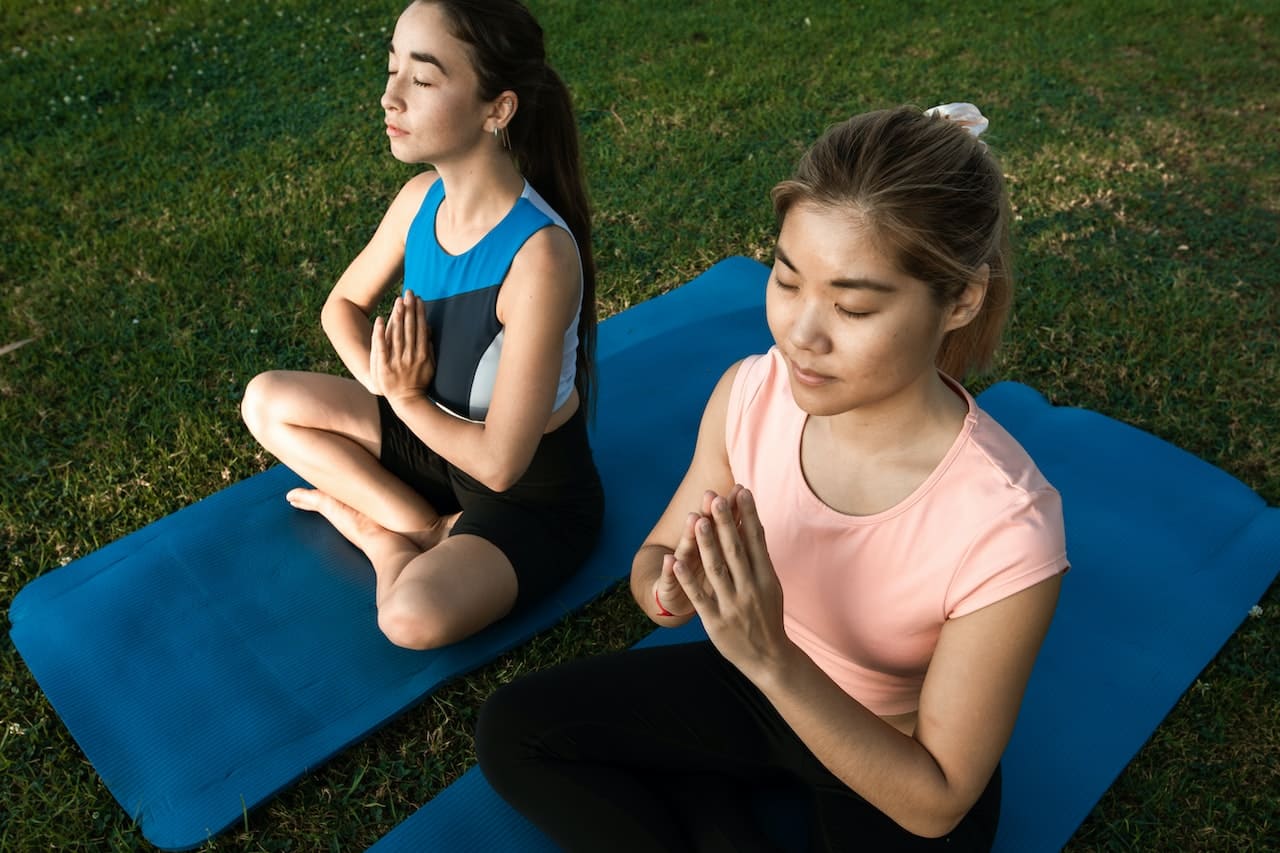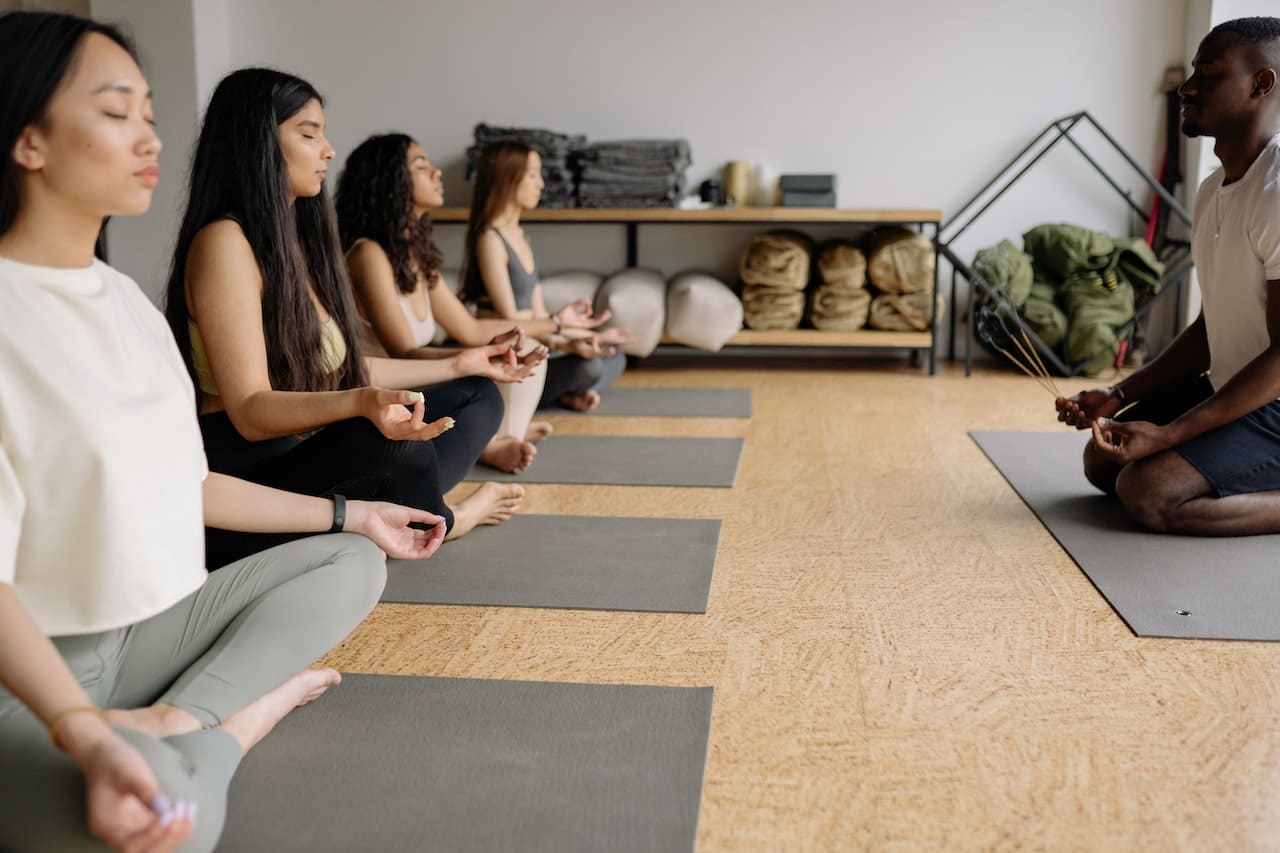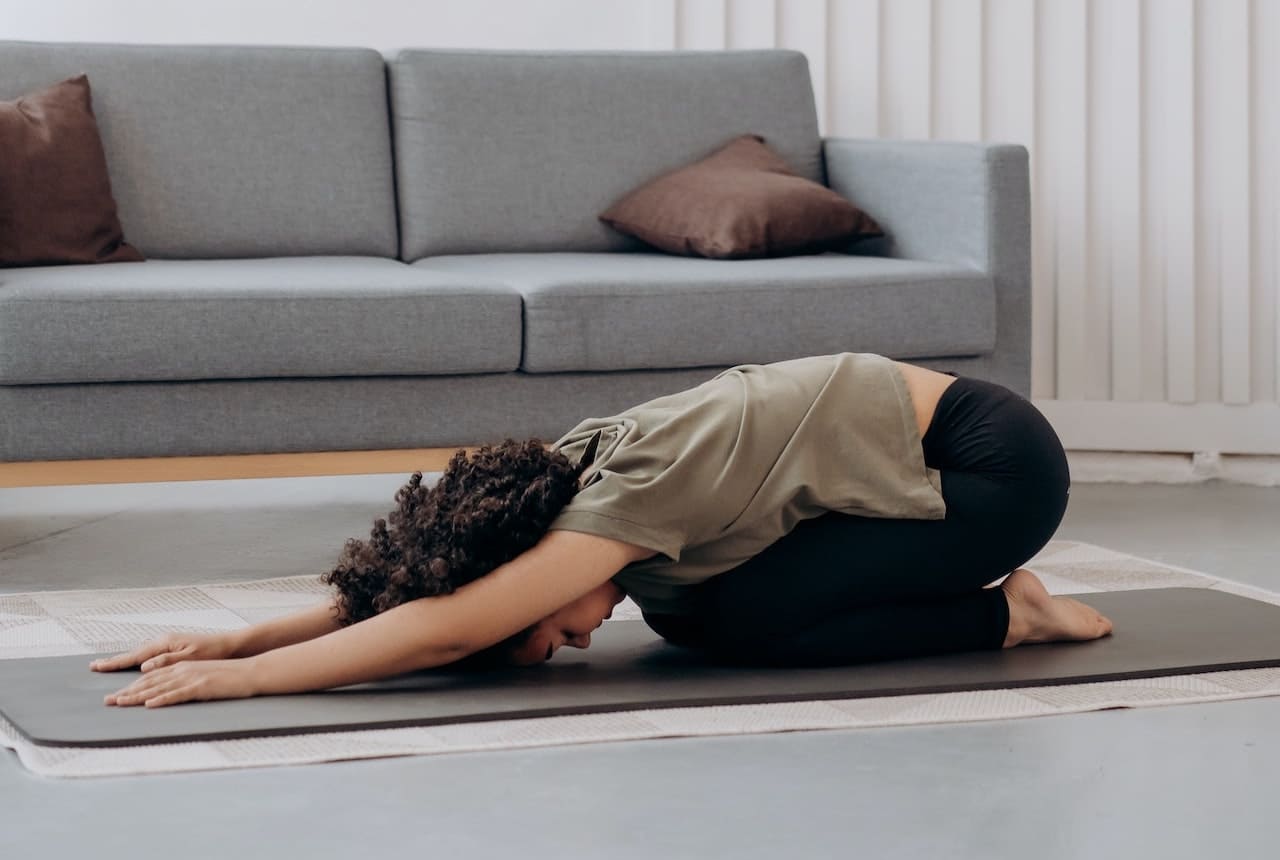Yoga for mental health: 5 key benefits & how to start yoga
Yoga for mental health can helps a person manage stress, developing coping skills, and reaching a more positive outlook on life.

Source: Pexels
Yoga, with its ancient roots, might just be the sanctuary your mind has been searching for. In our buzzing, notification-filled world, it's easy to forget the importance of pausing, breathing, and truly connecting with ourselves.
But here's the thing: yoga isn't just about achieving that perfect pose or impressing others with your flexibility. It's a bridge between the chaos outside and the peace within. It's about grounding ourselves when the world feels like it's spinning a tad too fast.
And guess what? In this article, we'll dive deep into the science behind yoga's magic, explore its myriad benefits for our mental health, and even guide you on how to kickstart your very own yoga journey.
So, are you ready to dive into the transformative power of yoga for mental well-being? Let's embark on this enlightening journey together. 🧘♂
The science behind yoga and mental health
Sorry to get all nitty-gritty on you in this section, but hey, we're diving into science, and it's essential to pull from credible sources to give you the real deal. Plus, while yoga has ancient roots, it's backed by modern science, which makes it all the more fascinating.
So, bear with us and let's unfold the science behind yoga and mental health.
The mind-body connection
Yoga is a golden bridge that connects the realms of our mind and body, creating a harmonious dance between the two. This connection isn't just a mystical concept but is well-acknowledged by the scientific community.
Researchers have explored and confirmed the intricate links between the body and mind through extensive studies. They affirm that practices like yoga, meditation, and mindfulness training are powerful tools in fostering this connection, enriching both our mental and physical health [1].
Yoga, in particular, is lauded for its ability to bring awareness to our breath, melding the mind and body into a state of synergy and healing [2] [3].
Neurophysiological Effects
Yoga doesn't just stop at calming your mind; it dives deeper into the neurophysiological realm. It has a soothing effect on the autonomic nervous system, reducing anxiety, depression, and enhancing heart rate variability (HRV), a marker of how well the body adapts to stress and emotions [4].
There's a sprouting body of evidence suggesting that yoga could be a boon in mitigating age-related and neurodegenerative declines, thereby hinting at its potential to enhance brain function and structure [5] [6].
Neuroplasticity
Your brain isn't set in stone; it's more like clay, ready to be moulded and refined. This ability to change is termed as neuroplasticity. Yoga, especially when coupled with meditation, can be a potter's wheel, shaping our brains towards positivity and growth.
Through practices like meditation, we can consciously influence our minds, expand our brains, and open ourselves to a realm of possibilities [7] [8].
A systematic review published on NCBI elaborates on the positive effects yoga has on brain structure and function, as evidenced by MRI, fMRI, and SPECT assessments [9].

Source: Pexels
Mindfulness and meditation
The meditative and mindfulness aspects of yoga are like gentle waves washing over the rocky shores of our turbulent minds, smoothing out the rough edges. A study even pointed out that yoga and meditation could foster resilience, enhancing our mental and physical well-being [10].
A study from Harvard Health affirms that yoga's emphasis on breathing practices and meditation help calm and centre the mind, shedding light on its potential to reduce anxiety and depression, and even sharpen the brain [11].
Hormonal balance
Yoga is a helpful way to work towards balancing hormones. It goes beyond just physical movement, helping to release stress which is often linked to hormonal imbalances.
Specifically, certain yoga sequences can help calm the nervous system and cleanse the body, which are key steps to addressing hormonal issues [12].
Through regular practice, yoga can help improve blood flow which in turn supports better digestion and hormonal balance. It has been noted to lower levels of the stress hormone cortisol, while boosting levels of serotonin, a hormone that contributes to feelings of well-being and happiness [13].
Additionally, yoga can provide relief from the discomforts associated with hormonal imbalances, making it a supportive practice for many, especially women [14].
Inflammation reduction
The relationship between yoga and inflammation is all about healing and prevention. Chronic inflammation, which can lead to other health issues, can be managed with regular yoga practice.
Yoga has been found to lower substances in the blood that cause inflammation, providing a natural way to fight the usual increase in inflammation due to stress and ageing [15].
A study highlighted by Harvard Health found that those practising yoga had lower levels of inflammation and lower levels of cortisol, the stress hormone. The same study found higher levels of a substance called Brain-Derived Neurotrophic Factor (BDNF) after yoga practice, suggesting yoga could also have protective effects for the brain [16].

Source: Pexels
5 key benefits of yoga for mental health
Alright, now let's get into the juicy bits! Yoga isn't just about getting those Instagram-worthy poses; it's a treasure trove of mental health gems. Let's unpack some of these, shall we?
1. Stress reduction
Ever felt like a teapot on the verge of whistling its top off? That's stress building up. Yoga, with its gentle stretches and mindful breathing, acts like a soothing hand on that teapot, preventing the whistle.
It triggers what's known as the relaxation response, which is basically your body's way of saying, "Hey, it's chill time!" By practising yoga regularly, you're giving your body and mind a mini-vacation from the hustle and bustle.
2. Enhanced mood and emotional regulation
Feeling blue? Or maybe a little too fiery? Yoga's got your back. The practice can give our mood a lovely lift, thanks to its impact on serotonin levels.
Plus, the mindfulness aspect of yoga helps us become more in tune with our emotions. It's like having an internal thermostat that helps us recognize and adjust our emotional temperature.
3. Improved concentration and cognitive function
Ever had those days where your brain feels like it's swimming in molasses? Yoga can be the lifeguard your brain needs.
The practice of dharana, or concentration, in yoga sharpens our focus. It's like giving your brain a workout, making it stronger and more agile. Over time, you might just find that tasks become a tad easier and your memory a bit sharper.
4. Anxiety and depression relief
Life can throw curveballs, leading to feelings of anxiety or sadness. While yoga isn't a magic wand, it's a powerful ally. The meditative aspects, combined with physical movement, create a holistic approach to mental well-being. It's like giving your mind a warm, comforting hug.
5. Enhanced self-awareness and mindfulness
Yoga is more than just poses; it's a journey inward. The practice encourages svadhyaya, or self-study.
As you flow on the mat, you start to connect deeper with yourself, understanding your strengths, triggers, and everything in between. It's like peeling an onion, layer by layer, getting to know the core of who you truly are.
Eager to dive even deeper into the fascinating world of yoga's science-backed perks? Don't miss our feature on the "Science-based Benefits of Yoga and 5 Best Yoga Classes in Singapore." It's not just a deep dive into the transformative powers of yoga, but also your go-to guide for the crème de la crème of yoga classes in Singapore.
How to start yoga for your mental health
So, you're sold on the idea of yoga for mental well-being (and honestly, who wouldn't be?). But where do you begin? Fear not, for we've got the roadmap ready.
1. Choosing the right style
Stepping into the world of yoga can feel a bit like walking into a bustling international food market. So many options, each with its unique flavour and essence! But don't fret; finding the right yoga style is all about aligning with what resonates with you.
Let's break down a few of the popular ones to help you navigate:

Source: Pexels
Hatha:
Hatha yoga serves as a foundational practice that encompasses a wide range of postures and breathing techniques. It is often recommended for beginners due to its balanced and comprehensive approach.
The primary focus in Hatha is to establish a firm grounding in the basics of yoga, ensuring a holistic understanding of both physical postures and breath control.

Source: Pexels
Vinyasa:
Vinyasa yoga is characterised by its fluid transitions between postures, synchronised with the breath. This style is dynamic and can be more physically demanding, making it suitable for those seeking an active practice.
The continuous flow in Vinyasa offers a cardiovascular benefit and is often favoured by those who appreciate a sense of rhythm and movement in their sessions.

Source: Pexels
Yin:
Yin yoga adopts a more passive approach, emphasising prolonged holds in postures to target the deeper connective tissues in the body.
This style promotes flexibility and is particularly beneficial for joint health. The extended holds also provide an opportunity for introspection and meditation, making Yin a deeply restorative practice.

Source: Pexels
Kundalini:
Kundalini yoga is a spiritually oriented practice that aims to awaken the dormant kundalini energy at the base of the spine. It integrates postures, breathwork, and mantra chanting to facilitate this awakening. Those drawn to Kundalini often seek a blend of physical exertion and spiritual exploration.
To delve deeper into specialised yoga practices, we invite you to explore our comprehensive blog. We've curated detailed insights on niche styles such as Hot Yoga, Chair Yoga, Mindful Yoga, and the nurturing Mom and Baby Yoga. Expand your yoga knowledge and discover a practice that resonates uniquely with you.
2. Finding the right teacher or class
The guidance of a seasoned yoga instructor can be invaluable. They not only ensure correct posture alignment but also infuse sessions with yogic philosophy and insights.
When selecting a teacher or class, consider their training lineage, years of experience, and any specialisations, especially in therapeutic or mental health-focused yoga.
By the way, if you're on the hunt for top-notch yoga classes worldwide, don't miss our curated list on the blog. We've handpicked stellar studios from Malaysia, Singapore, Mexico, the USA, and beyond. Dive in and discover your perfect yoga haven!
3. Creating a home practice
No studio nearby? No problem! Your living room can be your sanctuary. To start, carve out a little nook—a comfy mat, some calming lights, maybe a scented candle or two.
There are heaps of apps and online platforms offering guided sessions. Dive in, explore, and find your groove. Remember, it's your space, your rules.
4. Incorporating meditation and Pranayama (breathing techniques)
Meditation and pranayama are integral to yoga, especially for mental health. Meditation cultivates mindfulness, enhancing self-awareness and emotional regulation.
Pranayama, the art of breath control, directly impacts the autonomic nervous system, promoting relaxation and mental clarity. Beginners might start with Anulom Vilom [17] (alternate nostril breathing) or Bhramari [18] (humming bee breath) for their calming effects.
5. Setting realistic expectations
Let's get real for a sec. Yoga is a journey, not a destination. Some days you'll feel like a graceful swan, other days more like a wobbly duckling—and that's okay! Progress is gradual.
Celebrate the small victories, be patient with yourself, and remember: every time you step on the mat, you're taking a step towards better mental health.

Source: Pexels
Tips for maintaining a consistent yoga practice
So, you've dipped your toes into the yoga waters and are loving the vibe. But how do you keep the momentum going? How do you make yoga a consistent buddy and not just a fleeting summer fling? Dive in with us, and let's explore some tried-and-true tips to keep that yoga flame burning bright.
1. Setting a regular schedule
Consistency is key, and what better way to ensure it than by pencilling in your yoga dates? Whether you're an early bird catching the sunrise or a night owl stretching under the stars, find a time that feels right and stick to it. Treat it like an important meeting—with yourself!
2. Integrating yoga into daily routines
Who said yoga needs a dedicated hour? Sneak in mini-sessions throughout the day. A quick stretch post-shower, a 5-minute meditation during lunch, or some deep breathing while waiting for your coffee. It's like sprinkling little yoga magic dust all over your day.
3. Joining a yoga community or group
There's power in numbers! Joining a yoga community, whether online or offline, can be super motivating. Share experiences, learn from others, and bask in the collective energy. It's like having a cheer squad, always rooting for you.
4. Listening to your body
This one's golden. Your body is your best guide. Some days it might crave a vigorous flow, other days a gentle stretch. Tune in, listen, and honour its needs. Remember, yoga is not about pushing; it's about aligning—mind, body, and soul.
5. Keeping It fresh
Variety is the spice of life, and the same goes for yoga. Mix things up! Try a new style, explore different teachers, or maybe set a new intention for your practice. Keep the curiosity alive, and you'll never hit a yoga plateau.
In a nutshell? Consistency in yoga is less about discipline and more about passion. Find what lights you up, embrace the journey, and remember: every moment on the mat is a step towards a happier, healthier you.
Conclusion
From the ancient roots of yoga to its modern-day relevance, we've journeyed through the transformative power of this timeless practice. It's more than just stretches and poses; it's a dance of the mind, body, and soul—a harmonious symphony that sings of mental well-being.
In today's whirlwind world, where our minds are often cluttered with to-dos and what-ifs, yoga emerges as a beacon of calm. It's not just about flexibility of the body but flexibility of the mind, allowing us to navigate life's ups and downs with grace and resilience.
If there's one takeaway from our exploration, let it be this: Yoga is for everyone. Whether you're a seasoned practitioner or someone who's just curious, the mat awaits, promising a journey of discovery, healing, and growth.
A Special Note: But wait, before you go, we've got something special for you! 🎉 In honour of World Mental Health Day, we're thrilled to introduce our campaign: “Celebrate World Mental Health with Rezerv.”
Dive into a series of enlightening activities and, as a cherry on top, participate in our giveaway on Instagram and Facebook for a chance to win! We're giving away 3 Exciting Lululemon® wellness essentials that'll perfectly complement your yoga journey.
So, why wait? Join in, spread the word, and let's make mental health a celebration!
Friska 🐨
Read next: How to clean a yoga mat (Expert advice)
FAQs (Frequently Asked Questions)
1. How can yoga improve mental health?
Yoga is a holistic practice that intertwines the mind, body, and spirit. It can enhance mental health in several ways:
- Stress Reduction: Through deep breathing and relaxation techniques, yoga helps calm the nervous system, reducing the stress hormone cortisol.
- Mood Enhancement: Yoga can boost the production of serotonin, the "feel-good" neurotransmitter, lifting your spirits and combating feelings of sadness or depression.
- Improved Focus and Clarity: The concentration required in yoga can sharpen cognitive functions, leading to better focus and clarity in daily tasks.
- Emotional Balance: By promoting mindfulness, yoga helps you become more aware of your emotions, making it easier to regulate and manage them.
2. Can I start yoga even if I have no previous experience?
Absolutely! Yoga is for everyone, regardless of age, fitness level, or experience. Many yoga studios offer beginner classes, and there are numerous online resources tailored for newcomers. Remember, every seasoned yogi started as a beginner. It's all about taking that first step onto the mat.
3. What are some beginner-friendly yoga poses for mental wellness?
Several yoga poses are particularly beneficial for mental well-being and are beginner-friendly:
- Child's Pose (Balasana): A restful pose that helps calm the mind and relieve tension.
- Mountain Pose (Tadasana): A grounding pose that instils a sense of stability and focus.
- Downward-Facing Dog (Adho Mukha Svanasana): This pose rejuvenates the body and can help relieve mild anxiety.
- Tree Pose (Vrksasana): A balancing pose that promotes concentration and calmness.
- Corpse Pose (Savasana): Typically done at the end of a session, this pose deeply relaxes the body and mind.
4. How often should I practise yoga to see improvements in my mental health?
The beauty of yoga is that even a short session can bring about a sense of calm and clarity. For noticeable and sustained improvements in mental health, aim for a consistent practice—whether that's 10 minutes daily or longer sessions 3-4 times a week.
As with any wellness practice, consistency is key. Over time, you'll likely notice a more balanced mood, reduced stress, and enhanced overall well-being.
Source: The Benefits of Yoga: How It Boosts Your Mental Health | Houston Methodist On Health

